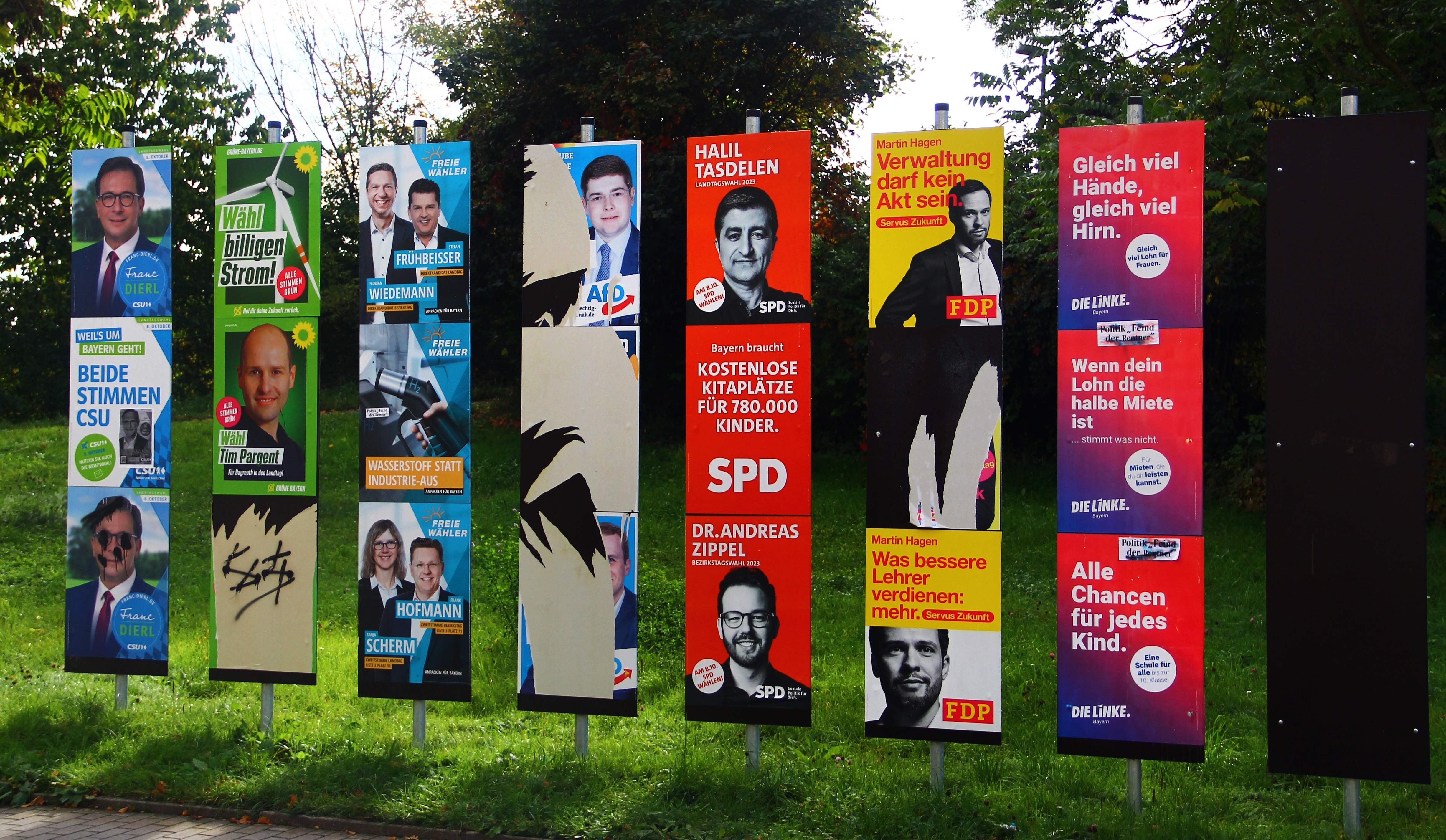Government of National Unity
Ahead of Germany's own elections, are there any lessons from the South African context?

Bayreuth, Germany - October 13, 2023: Pre-election posters of different political parties with portraits of local politicians in Bayreuth, Upper Frankonia
© ShutterstockRecent polls predict that the far right populist party (AfD) will be successful in all three German provincial elections this fall in Thuringia, Saxony and Brandenburg. This outcome will make coalition-building for the democratic parties a difficult task, as a broad coalition may be required to prevent a government led by the AfD. A striking example of such broad cooperation among party interests is the Government of National Unity (GNU) inaugurated for the second time in South Africa in 2024 after the African National Congress (ANC) lost its absolute majority.
A Highly Fragmented Germany
Election results suggest that parties on the extreme edge of the political spectrum, including the AfD and the newly emerged left-wing party (BSW), will be among the winners in the German provincial elections. For instance, in Thuringia, democratic parties are predicted to secure only 29 of 88 seats, which is far from a majority. To prevent a government led by the AfD, they would need to consider cooperation among CDU, SPD, Die Linke, and BSW—though this seems unlikely, as the CDU refuses to govern with extreme left-wing parties like Die Linke and BSW. A similar challenge is anticipated in Saxony, where democratic parties are projected to obtain only 56 of 120 seats in parliament.
To avoid an AfD-led government, the parties have two options: they could form a minority government, which carries the risk of instability and the need for new alliances for every project, or they could pursue a government of national unity, as recently implemented in South Africa.
The Role Model of a South African Government Led by Unity
South Africa first experienced a Government of National Unity (GNU) in 1994 under Nelson Mandela. This form of government aimed to unify all democratic parties in a single government with a vast majority. Following the end of Apartheid, the goal was to reconcile a highly divided country as well as ensuring peace and stability. In 2024, after historic losses by the African National Congress (ANC), a GNU was proposed, consisting of the two largest parties, the ANC (40.18%) and the Democratic Alliance (DA) (21.81%), along with eight other smaller parties. The GNU prevented South Africa from falling into a so-called “Doomsday Coalition,” which would have included the ANC, the Economic Freedom Fighters (EFF)—a populist left-wing party—and uMkhonto we Sizwe (MK), a populist party led by former President Zuma, who was removed from office due to alleged corruption. Similarly, any coalition with the AfD in Germany could be described as a “Doomsday Coalition.”
Germany Can Learn to Form a Government Faster
The predicted challenging election results in Germany present another opportunity to learn from South Africa. The South African constitution mandates a 12-day deadline after elections to elect a new President and form a government. In contrast, Germany lacks such a deadline, and negotiations can take a significant amount of time, as evidenced by the 171 days it took to form a government after the failure to establish the “Jamaica coalition” in 2017. Incorporating a similar deadline into the German constitution could expedite the formation of a new government, allowing it to get to work more promptly. Article 39 of the Grundgesetz only requires Parliament to convene within 30 days after the elections but does not address the election of the Chancellor, who is the German equivalent of the South African President.
The Weakness of the German Liberals
Another lesson from South Africa relates to the strength of the liberal party (DA). The DA's national result of 21.8% is a figure the German liberals (FDP) can only aspire to. Moreover, in the upcoming provincial elections in Saxony, Thuringia, and Brandenburg, the FDP is not expected to reach the 5% threshold needed to enter parliament.
It remains to be seen what the German national elections, scheduled for September 2025, will bring for the FDP, which is projected to gain only 5% after winning 11.5% in 2021. However, on a national level, the need for a government of national unity seems less urgent, as coalitions between democratic parties such as CDU and SPD could ensure a majority. Nonetheless, the formation of a government of national unity could be beneficial for Germany to prevent the further strengthening of populist parties like the AfD or BSW.
Johannes Jüngling is an intern scholar at the Sub-Saharan Africa Regional Office of the Friedrich Naumann Foundation for Freedom.
